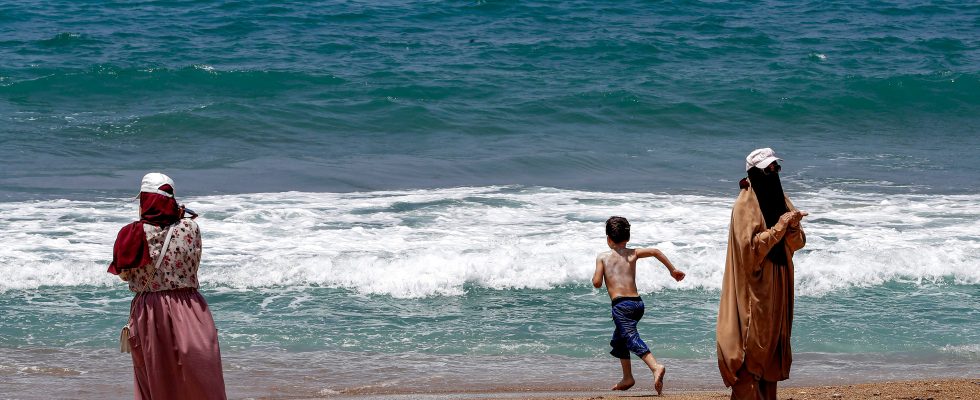In the suburbs of Paris, in an association dealing with young people from working-class neighborhoods, I asked teenage girls, mostly veiled, to present France in a few words to someone from elsewhere, like me. The term “racism” was omnipresent. They all agreed: this term summed up France well and for many reasons. Clothing, the abaya like the burkini, came first. Summer is coming, and these girls can’t go to the pool because of the burkini ban. When I questioned them on the reasons for this prohibition, they answered me: “It would not be hygienic, but it is only a pretext, the men will thus see our bodies.”
A few days later, on May 21, on the beach of Saïda, a Lebanese town south of Beirut, under the influence of fundamentalists, a woman was taken to task, accused of not respecting local custom by wearing a swimsuit of bath. Accompanied by her husband, she had nevertheless moved away.
At first glance, these two scenes seem different. A swimsuit forbidden there, a burkini not allowed here. But one point brings them together: the civility specific to each society. This civility may change from one period to another. Looking at the photos of the 1970s in Syria, we discover that the majority of women were not veiled and went to the beach in swimsuits. This was the case with my grandmother’s generation. But, from the 1980s, when the Muslim Brotherhood lost their political fight against the regime, they decided to infiltrate society and establish their own norms. The Islamists have distributed religious books in schools and universities, broadcast songs presenting women wearing the veil as respectful and respectable, while the non-veiled appeared as delicacies offered to all. That’s when my grandmother put on the veil to go with the flow. Unveiled women, especially in predominantly Sunni cities and towns, were viewed as morally depraved.
It was above all a question of identity, and not of religion. The veil, just like the burkini or the abaya, has become for women a flag signifying that they are different: neither Alawites nor Christians, but true Sunni Muslims. Since then, feminist movements have put themselves in danger by calling for the rejection of the hijab. Nawal El Saadawi, a figure of Arab feminism, said: “It is not the woman who must be veiled so as not to excite the man, it is the man who must veil his eyes.”
Today, in the Middle East, streets and beaches are different from the 1970s. There is no longer any question of a woman wearing a swimsuit, except for certain private beaches, so as not to shock the public opinion. Ditto for the hijab: it is no longer normal for a girl not veiled to come to certain high schools. The fundamentalists won.
Taken hostages
Of course, the girls wearing the veil in France, like those of the association that I met, are not guilty of wearing this outfit that is foreign to our society. They are taken hostage by an identity Islamist discourse. But the saddest part of this story is the commitment of a few “feminists”. Following the controversy over the practice of prayer in schools in Nice, the Minister of Education undertook to ban prayers and religious dress to respect the “religious, philosophical or political neutrality of schools. ” Stating that it was a reminder of “rules and pedagogy”. Feminists have condemned this reaction, considering it a case of “Islamophobia”. These “halal” feminists do everything to defend what those of the Middle East refuse.
This reminds us of last year, when a hundred feminist organizations called in a forum to modify the regulations of municipal swimming pools. With a watchword: “We have the right to dispose of our bodies as we wish.” This was following the controversy that left Grenoble, whose mayor had modified the internal regulations of the city’s swimming pools in order to authorize bathing suits that fully cover the body and the head. However, we have not seen any French feminist association supporting Saïda’s wife. In Lebanon, on the very day of the event, dozens of people demonstrated on this beach to defend it. Very quickly, they were attacked by the Islamists.
Between the burkini in France and the bikini in the Middle East, the abaya in France and the miniskirt in Arab countries, a paradox appears. There, feminists defend themselves against the veil, against honor killings, against the marriage of underage girls and against the mutilation of girls, simply to return to the society before, that of the 1970s, when individual freedom had its place. Here in France, some are mobilizing for a cause that has nothing to do with freedom, but everything to do with a separatist identity, based on a religious ideology.
* Writer and poet born in Damascus, Omar Youssef Souleiman took part in the demonstrations against the regime of Bashar el-Assad, but, tracked down by the secret services, had to flee Syria in 2012. A refugee in France, he published with Flammarion The Little Terrorist, The Last Syrian And A Chamber in Exile.
